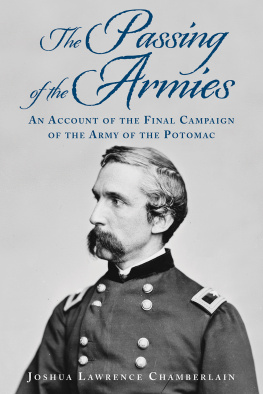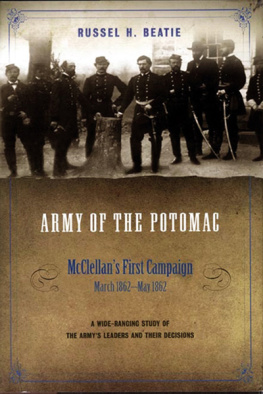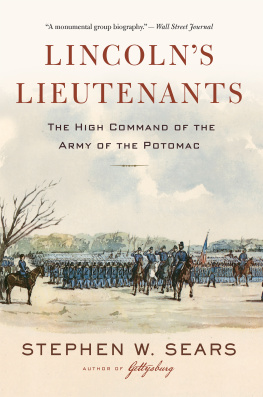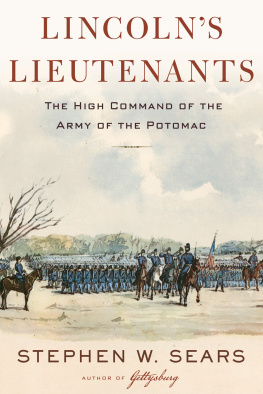All Rights Reserved. No part of this book may be reproduced in any manner without the express written consent of the publisher, except in the case of brief excerpts in critical reviews or articles. All inquiries should be addressed to Skyhorse Publishing, 307 West 36th Street, 11th Floor, New York, NY 10018.
Skyhorse Publishing books may be purchased in bulk at special discounts for sales promotion, corporate gifts, fund-raising, or educational purposes. Special editions can also be created to specifications. For details, contact the Special Sales Department, Skyhorse Publishing, 307 West 36th Street, 11th Floor, New York, NY 10018 or .
Skyhorse and Skyhorse Publishing are registered trademarks of Skyhorse Publishing, Inc., a Delaware corporation.
Visit our website at www.skyhorsepublishing.com.
Library of Congress Cataloging-in-Publication Data is available on file.
The Passing of the Armies
An Account of the Final Campaign of the
Army of the Potomac, Based upon
Personal Reminiscences of the Fifth Army Corps
By
Joshua Lawrence Chamberlain
Brevet Major-General U. S. Volunteers
With Portraits and Maps
and a Biographical Note by George H. Putnam

Skyhorse Publishing
BIOGRAPHICAL NOTE
J OSHUA LAWRENCE CHAMBERLAIN, who won distinction both as a soldier and as a citizen, for the State of Maine, and for the whole country, was born in Brewer, Maine, September 8, 1828. His parental lineage is traced back to England, but on the mothers side he is descended from Jean Dupuis, who came, in 1685, with other Huguenots, from La Rochelle to Boston. Young Chamberlain was brought up in the country district of Brewer. As Greek was not included in the curriculum of the school where he prepared for college, with the aid of a tutor he attacked that language at home, and in six months, at the age of nineteen, had mastered the amount required for entrance to Bowdoin. In his college course, he took honors in every department. After his graduation in 1852, he entered the Theological Seminary at Bangor, and for several years gave attention to the reading of theology, and of church history in Latin and German. His work included the study of the Hebrew, Syriac, and Arabic languages. He earned an ample income for his sojourn in the seminary by teaching classes of young ladies the German language and literature, while he also served as Supervisor of Schools in his native town of Brewer. He continued his interest in Sunday-school work, helping to maintain a flourishing school some three miles from Bangor.
In 1856, as a result of his Masters Oration on Law and Liberty, he was appointed instructor in Bowdoin in Natural and Revealed Religion, a post that had been vacated by Professor Stowe. A year later, he was elected a Professor of Rhetoric and Oratory, which place he held for four years. In 1861, he was elected Professor of Modern Languages, and in July, 1862, was granted leave of absence for two years for the purpose of pursuing studies in Europe. The need at this time of the Republic for all its able-bodied citizens caused him, however, to give up the European trip and to offer his services for action in the field. In August, 1862, he went to the front as Lieutenant-Colonel of the Twentieth Regiment of Maine Volunteers. In May, he received commission as Colonel, the duty of which post he had been fulfilling for some months. His regiment was included with the Fifth Corps, and at Gettysburg on the second of July, 1863, it held the extreme left of the Union line. Colonel Chamberlains conduct in the memorable defense of Little Round Top (a position which with admirable judgment had been seized by General Warren) was recognized by the Government in the bestowal of the Congressional Medal of Honor for conspicuous personal gallantry and distinguished service.
After Gettysburg, Colonel Chamberlain was placed in command of the Light Brigade, which he handled with marked skill in the action at Rappahannock Station. The wounds received in that battle made necessary retirement for a time to the Georgetown Hospital, but during his convalescence he gave valuable service as member of a Court-Martial. He returned to the front in May, 1864, when General Warren, at that time in command of the Fifth Corps then stationed at Spottsylvania, made Colonel Chamberlain the commander of a forlorn hope of nine regiments which had been selected to make a night assault on the enemys works. The position was gained, but Chamberlain found his line outflanked, and was compelled to withdraw under heavy fire. Shortly after the action at Cold Harbor, while still holding the rank of Colonel, he was placed in charge of six regiments, consolidated as a veteran brigade. With this brigade, he made a charge on the enemys main works at Petersburg, as a result of which action he was promoted on the field by General Grant to the rank of Brigadier-General for gallant conduct in leading his brigade against the superior force of the enemy and for meritorious service throughout the campaign. Such promotion on the field was most exceptional, and there is possibly no other instance during the war. In this charge General Chamberlain was seriously wounded, and his death was in fact announced. His life was saved through the activity of his brother Thomas, late Colonel of the Twentieth Maine, and the skill and tireless fidelity of the regimental surgeon, Dr. Shaw.
During the last campaign of the war, General Chamberlain, with two brigades, led the advance of the infantry with Sheridan, and in the fight on the Quaker Road he was twice wounded and his horse was shot under him. For his conspicuous gallantry in this action, he was promoted to the brevet rank of Major-General. In the fight at White Oak Road, March 31st, although seriously disabled by wounds, General Chamberlain distinguished himself by recovering a lost field; while in the battle of Five Forks, of April 1st, his promptitude and skillful handling of troops received again official commendation. In the final action near Appomattox Court House on the ninth of April, Chamberlain was called by General Sheridan to replace the leading division of cavalry, and the first flag of truce from Longstreet came to Chamberlains headquarters. His Corps Commander says in an official report: In the final action, General Chamberlain had the advance, and at the time the announcement of the surrender was made he was driving the enemy rapidly before him.
At the surrender of Lees army, General Chamberlain was designated to command the parade, and it was characteristic of his refined nature that he received the surrendering army with a salute of honor. At the final grand review in Washington, Chamberlains division was placed at the head of the column of the Army of the Potomac. The General was mustered out of military service on the sixteenth of January, 1866, having declined the offer of a Colonelcy in the regular army. In his service of three-and-a-half years, he had participated in twenty hard-fought battles and a long series of minor engagements, and he had been struck six times by bullet and shell.
During his campaign experience, he had shown marked ability as a commander, but he had other qualities as important, namely, foresight, prudence, and a strong sense of responsibility. On his return to Maine, he was offered the choice of several diplomatic offices abroad, but was at once elected Governor of Maine by the largest majority ever given in the State. As Governor, while rendering exceptional service to the State, he suffered criticism on various grounds, and among others through his support of the course of Senator Fessenden, of Maine, in the impeachment of President Johnson.















